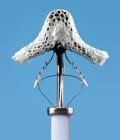
The MitraClip transcatheter mitral valve repair device
September 11, 2009 – Abbott said yesterday it reached an $410 million agreement to purchase Evalve Inc., the global leader in the development of devices for minimally invasive repair of cardiac mitral valves.
The acquisition provides Abbott with a presence in the growing area of nonsurgical treatment for structural heart disease, in which physicians use catheter-based devices to repair or replace basic structural components of the heart, such as mitral and aortic valves. The agreement includes an upfront payment of $320 million in cash, plus an additional payment upon completion of certain regulatory milestones, for a total of up to $410 million, Abbott said.
"The acquisition of Evalve will provide Abbott with leading technology in the emerging field of minimally invasive heart valve repair and further broadens Abbott's medical devices portfolio," said John M. Capek, Ph.D., executive vice president, medical devices, Abbott. "Evalve is on the cutting edge with its nonsurgical approach to treating structural heart disease. With this breakthrough mitral valve repair technology, physicians will be able to offer their patients a minimally invasive alternative to open heart surgery — not unlike the opportunity that stents provided more than two decades ago for the treatment of coronary artery disease."
Mitral regurgitation, a condition that prevents the mitral valve from closing completely, is the most common type of heart valve insufficiency in Europe and the United States, and affects millions of people worldwide. Traditionally, mitral regurgitation is treated through open-heart surgery. However, only about 20 percent of the 600,000 patients diagnosed in the U.S. and Europe each year undergo surgery. Evalve's minimally invasive catheter-based MitraClip system, used to clip the leaflets of the mitral valve together to reduce regurgitation, is the first commercially available treatment option approved in Europe for nonsurgical mitral valve repair for patients suffering from the effects of mitral regurgitation. The MitraClip system is an investigational device in the United States and is currently in clinical trials.
"Patients in Europe have benefited from having access to the MitraClip technology since it received CE mark last year," said Ferolyn Powell, president and chief executive officer of Evalve, who will continue to lead the Evalve team. "We look forward to becoming a part of Abbott and working together to accelerate our business and expand our global reach to patients around the world with our minimally invasive technologies."
The transaction is subject to customary closing conditions, including antitrust clearances. Abbott expects the transaction to close in the fourth quarter of 2009.
Clinical trains in the U.S.
In August the Journal of the American College of Cardiology (JACC) published data from the EVEREST (Endovascular Valve Edge-to-Edge REpair STudy) trial for the MitraClip. Researchers said the therapy can reduce acute mitral regurgitation (MR) with sustained freedom from death, surgery or recurrent MR in a substantial proportion of functional and degenerative MR patients.
The published data is from the initial cohort of 107 registry patients treated. Seventy-four percent of patients achieved MR reduction to 2+ or less after receiving the MitraClip device. In 64 percent of these, MR reduction to 1+ was achieved. Additionally, there were no cases of clip embolization or procedural mortality. Kaplan-Meier freedom from surgery was 88.5 percent, 83.2 percent and 76.3 percent at one, two and three years, respectively. Prior to the MitraClip procedure 100 percent of patients were indicated for surgery.
"We have seen procedural success in the majority of patients treated with the MitraClip system," said Ted Feldman, M.D., director of the cardiac catheterization lab at Evanston North Shore Hospital, coprincipal investigator of the EVEREST trial and lead author of the JACC manuscript. "The results we've seen expand the range of options available to patients affected by MR, especially for people who are not good candidates for surgery or who want to avoid the risks of a surgical procedure."
The study population included 107 registry patients with moderate-to-severe (grade 3+) or severe (grade 4+) MR who were candidates for mitral valve surgery. Of these patients, 79 percent had degenerative MR and 21 percent had functional MR. Among patients with functional MR, 74 percent had a history of coronary artery disease and 43 percent had prior bypass surgery.
At baseline, patients either presented with symptoms or when without symptoms, they had compromised left ventricular (LV) function, as defined by an ejection fraction less than 60 percent or a systolic ventricular size greater than 40 mm.
Transthoracic echocardiography was performed at baseline, predischarge, and at one, six, 12 months, and yearly thereafter up to five years. The data was analyzed by an independent echocardiographic core laboratory at the University of California, San Francisco under the direction of Elyse Foster, M.D.
Mitral repair with Evalve's MitraClip device is performed by physicians in the catheterization laboratory. The heart beats normally during the procedure, and therefore does not require a heart-lung bypass machine. In addition to improving blood flow through the heart, the procedure may also relieve symptoms such as fatigue and shortness of breath that often affect patients with significant MR.
For more information: www.evalveinc.com, www.abbott.com


 December 24, 2025
December 24, 2025 









